Top 10 Health Benefits of Kimchi
Traditionally made from salted, fermented vegetables, kimchi is a cuisine from Korea. Cabbage and condiments including sugar, salt, onions, garlic, ginger, and ... read more...chili peppers are frequently included. Additionally, it could include spinach, scallions, beets, cucumber, eggplant, radish, celery, carrots, and bamboo shoots. Kimchi can be consumed fresh, or unfermented, right away after preparation even though it is often fermented for a few days to a few weeks before serving. This dish is not only delicious but also has a lot of health advantages. The best health advantages of kimchi are listed below.
-
Kimchi has few calories and is rich in nutrients. Chinese cabbage, one of the key ingredients in kimchi, contains around 34 amino acids, at least 10 distinct minerals, and vitamins A and C on their own. The actual nutritional makeup of kimchi varies greatly depending on the materials used in different batches and brands. All the same, a 1-cup (150-gram) serving contains approximately:
- Calories: 23
- Carbs: 4 grams
- Protein: 2 grams
- Fat: less than 1 gram
- Fiber: 2 grams
- Sodium: 747 mg
- Vitamin B6: 19% of the Daily Value (DV)
- Vitamin C: 22% of the DV
- Vitamin K: 55% of the DV
- Folate: 20% of the DV
- Iron: 21% of the DV
- Niacin: 10% of the DV
- Riboflavin: 24% of the DV
Numerous green vegetables are excellent suppliers of vitamins K and riboflavin. The green vegetables that are frequently used in kimchi, such as spinach, cabbage, and celery, make it a fantastic source of these vitamins and minerals. Riboflavin helps control energy production, cellular growth, and metabolism, whereas vitamin K is crucial for many biological processes, including bone metabolism and blood coagulation. Additionally, the fermentation process can result in the development of new nutrients that are simpler for your body to absorb.

Nutrient dense 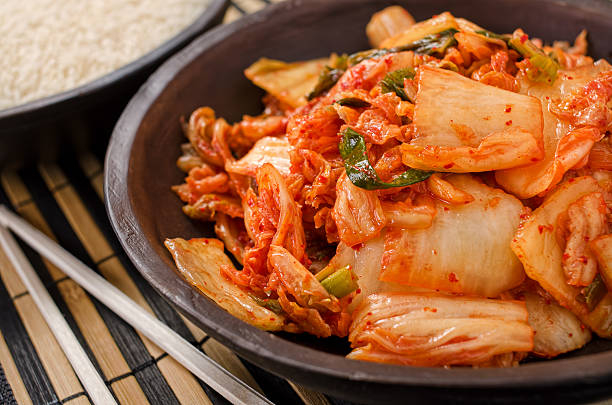
Nutrient dense -
The Lacto-fermentation process that kimchi goes through gives it a special flavor. In addition to having a longer shelf life, fermented foods also have better flavor and scent. When organisms like yeast, mold, or bacteria transform a starch or sugar into an alcohol or an acid, fermentation has taken place. The bacterium Lactobacillus is used in Lacto-fermentation to convert carbohydrates into lactic acid, which gives kimchi its distinctive sour flavor.
This bacterium may have various advantages when consumed as a supplement, including the ability to treat illnesses including hay fever and some kinds of diarrhea. Additionally, fermentation fosters an environment that promotes the growth and proliferation of additional beneficial microorganisms. Probiotics are one of these; they are live microorganisms that, when ingested in high quantities, have positive health effects. Keep in mind that many of these findings are related to high-dose probiotic supplements and not the amounts found in a typical serving of kimchi. The probiotics in kimchi are believed to be responsible for many of its benefits. Nonetheless, more research on the specific effects of probiotics from fermented foods is needed
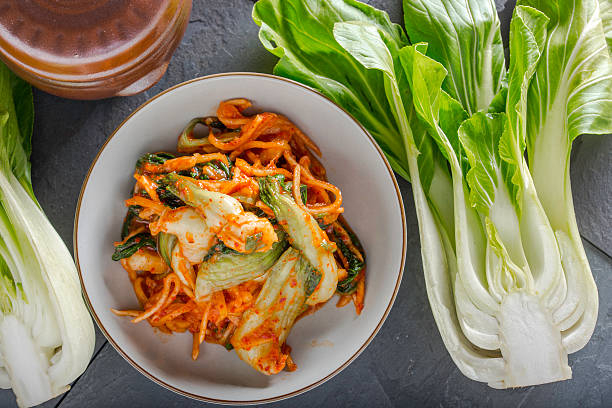
Contains probiotics 
Contains probiotics -
Kimchi's Lactobacillus bacterium may improve your immune system's performance. Tumor necrosis factor-alpha (TNF alpha) levels were lower in mice given injections of Lactobacillus Plantarum, a particular strain found in kimchi and other fermented foods, than in the control group. TNF alpha levels are frequently increased during infection and sickness, so a decline shows that the immune system is functioning effectively.
A test-tube study using Lactobacillus Plantarum, a bacteria that was isolated from kimchi, also showed that this organism possesses immune-boosting properties. Although these findings are encouraging, the further human study is required.

May strengthen your immune system 
May strengthen your immune system -
Inflammation may be reduced by the probiotics and active ingredients in kimchi and other fermented foods. For instance, a mouse study found that the key ingredient in kimchi, HDMPPA, enhanced blood vessel function by reducing inflammation. In another mouse study, levels of inflammation-related enzymes were reduced when a kimchi extract was given daily for two weeks at a dose of 91 mg per pound of body weight (200 mg per kg). A test-tube investigation, meantime, supported the notion that HDMPPA has anti-inflammatory effects by preventing and restraining the production of inflammatory substances.
Chronic inflammation has been linked to a number of diseases as well as hastening aging. It's interesting to think that kimchi might extend cell life by slowing this process. Human cells treated with kimchi in a test-tube study revealed enhanced viability, which gauges general cell health, as well as a longer life span regardless of their age. The overall research is still inadequate. It will take a lot more research before kimchi is suggested as an anti-aging remedy.

May reduce inflammation 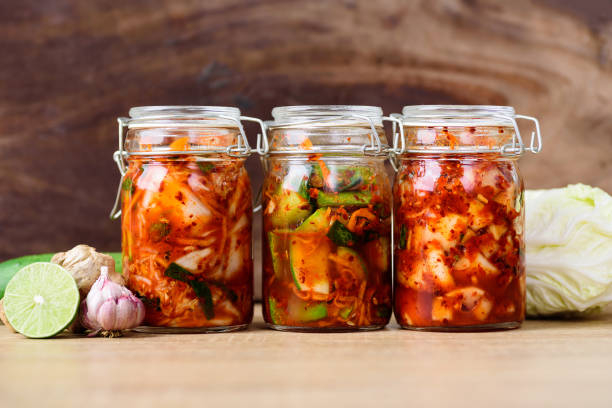
May reduce inflammation -
The probiotics and beneficial bacteria in kimchi may aid in preventing yeast infections. When the generally benign Candida fungus grows fast inside the vagina, it can cause vaginal yeast infections. Each year, more than 1.4 million Americans receive treatment for this illness.
Many experts are exploring natural remedies because this fungus may be becoming resistant to drugs. Studies on animals and in test tubes indicate that specific Lactobacillus strains can combat Candida. Multiple kimchi strains derived from this fungus even showed antibacterial activity against it, according to a test-tube study.
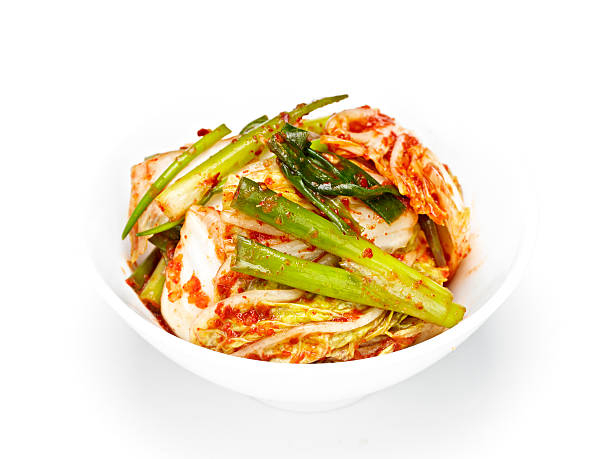
May prevent yeast infections 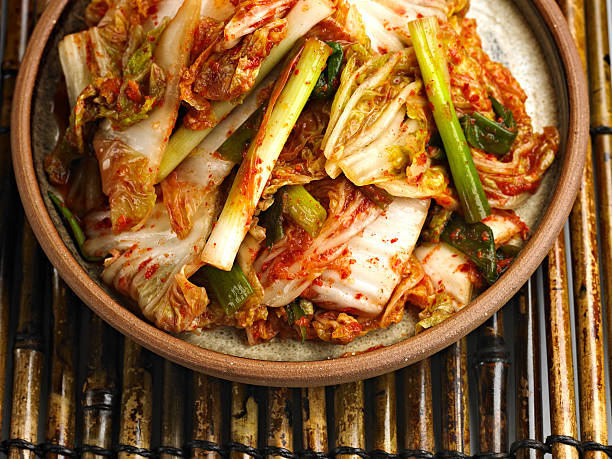
May prevent yeast infections -
Kimchi can help you lose weight and is low in calories whether it is fresh or fermented. Eating fresh or fermented kimchi helped lower body weight, body mass index (BMI), and body fat, according to a 4-week study of 22 obese participants. The fermented variety also lowered blood sugar levels.
Remember that compared to those who consumed the fresh meal, those who consumed fermented kimchi showed noticeably bigger decreases in blood pressure and body fat percentage. It's unclear which aspects of kimchi—such as its low-calorie count, high fiber content, and probiotics—are responsible for its capacity to aid in weight loss.

May aid weight loss 
May aid weight loss -
According to research, kimchi may lower your risk of developing heart disease. Its anti-inflammatory characteristics may be to blame for this, as new research indicates that inflammation may be a root cause of heart disease. In an 8-week trial using mice fed a high-cholesterol diet, those given kimchi extract had lower blood and liver fat levels than those in the control group. The kimchi extract also seems to inhibit fat growth.
This is significant because the buildup of fat in these regions may be linked to heart disease. The consumption of 0.5 to 7.5 ounces (15 to 210 grams) of kimchi daily resulted in significant reductions in blood sugar, total cholesterol, and LDL (bad) cholesterol levels, all of which are risk factors for heart disease, according to a week-long study involving 100 participants.
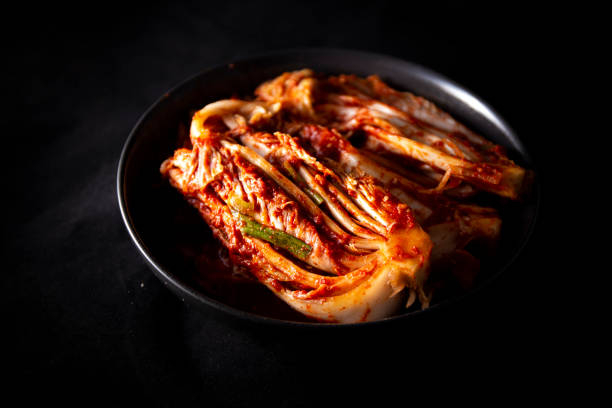
May support heart health 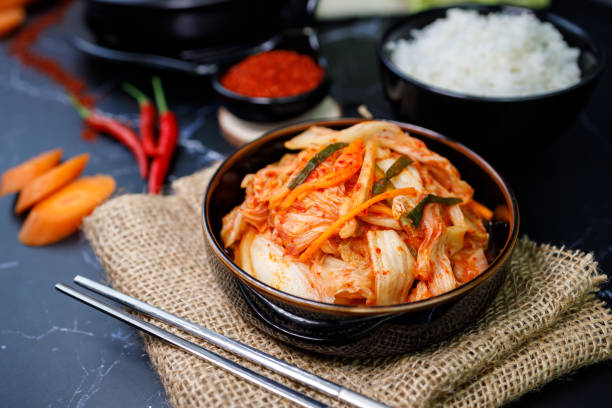
May support heart health -
Researchers from the Department of Food Science and Nutrition at Pusan National University in Korea found that kimchi lowers blood glucose levels and levels of total and LDL (bad) cholesterol. This was discovered in a randomized experiment.
The cholesterol levels are benefited by regular kimchi eating. It is prepared with garlic, which is high in selenium and allicin. These two elements, along with a good diet and exercise, are believed to aid in lowering harmful levels. The prominent ingredient allicin, which is thought to help lower cholesterol, may also cut the chance of developing cardiac problems like strokes and heart attacks. By limiting the formation of plaque and reducing the risk of atherosclerosis, selenium may also have a protective impact on the arterial walls.
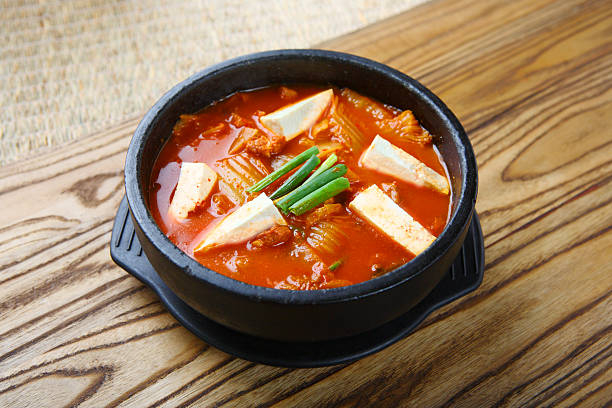
May regulates cholesterol 
May regulates cholesterol -
Kimchi is a versatile condiment because of the lactobacillus bacteria that are present in it. It extends its therapeutic effects to treat a variety of skin conditions, including atopic dermatitis, which is marked by elevated immunoglobulin E levels and skin lesions like edema and bleeding. A 2018 Korean study on mice suggests that kimchi may help to treat atopic dermatitis. Another animal study that was published in the Journal of Applied Microbiology demonstrated the beneficial effects of the good bacteria found in fermented kimchi on mite-induced dermatitis as well as the role they play in lowering inflammation. To determine the advantages for people with atopic dermatitis, more research would be necessary.
In cases of gastritis and peptic ulcer illness brought on by Helicobacter pylori bacteria, kimchi is medicinal. Research in this area has demonstrated that the antagonistic properties of kimchi are due to the high concentration of Lactobacillus bacteria, which can prevent dangerous pathogens from interacting with human stomach cancer cells.

Have a therapeutic effect on atopic dermatitis 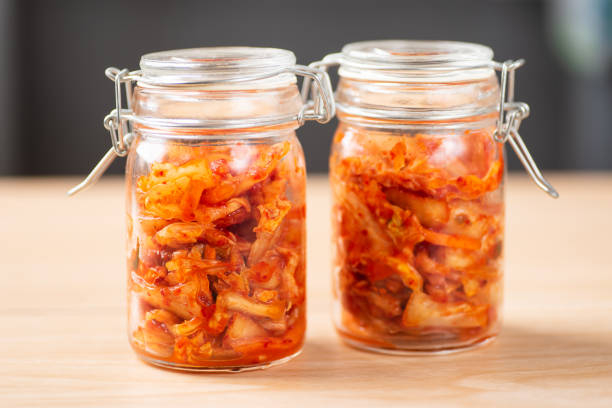
Have a therapeutic effect on atopic dermatitis -
According to a study that was published in the Journal of the Science of Food and Agriculture, kimchi is a food that helps with digestion. Due to the fermentation process used in its manufacture, it is a potential source of probiotics. The fermentation process not only improves flavor but also produces Lactobacillus, a beneficial bacteria that the body needs to maintain a healthy balance of intestinal flora.
Cabbage, the main ingredient in kimchi, is already well recognized for its many health advantages, including supporting digestive health and avoiding constipation thanks to the fiber it contains.
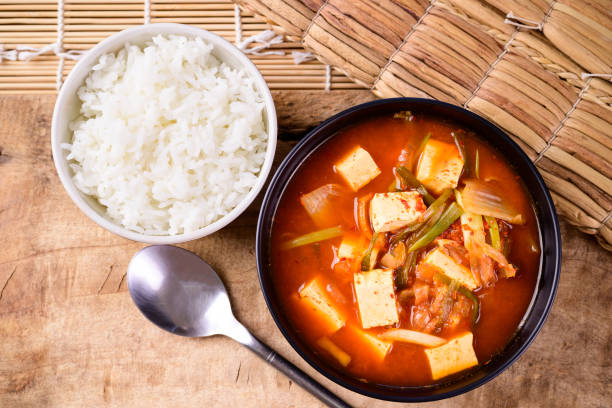
May promote digestion 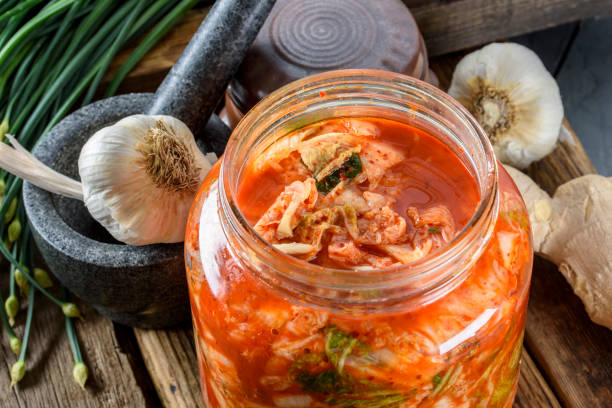
May promote digestion































